The Teaching YearsBy Beryl DarrahMy first teaching job came about pretty much by accident. Being fresh out of college and not very sophisticated, I really had no idea on how to proceed with my job hunt. I applied for a job in Junction City doing something---probably teaching history and government. They told me to come back after I had some experience. I received a call from a one-room school somewhere in the barren, deserted reaches of Western Kansas. That was my first job offer. I could have taken the job IF I wanted to teach all eight grades; live alone in the basement of the school; be the janitor and handyman; and work for something like $3000 a year. Needless to say I did not take the job. A local woman who had been teaching in a two room school north of Lyons asked me one day while I was working at Dillons if I had found a job. She told me she was quitting her job to accept a position in either Sterling or Lyons and suggested I call and ask about replacing her. Although I don't remember much about the interview, I do know that I was hired on the spot. I was given an 8 months contract and paid the grand sum of $3600 (less than a month's pay now). So now I was the new teacher of grades 5 through 8 at Fairplay School. I
would drive up to the school during the summer and work on lesson
plans, although I really had little idea of what to expect. But I
felt important sitting behind the
teacher's desk, even with no students in
the classroom. When school finally did start, I had a total of
something like 8 students spread out over Stop and think for a minute. Four grades and at least six subjects per grade (reading, math, English, science, social studies and spelling). That's twenty-four subjects per day that I would have to teach. Of course, it really didn't happen that way. After a while, it all sort of blended into one big class. The fifth graders had already heard what the eighth graders were learning, and by the time a student got to be an eighth grader, he had heard it four times. It's no wonder kids from the country schools did so well on the high school entrance tests, which they had to take back in those days in order to be accepted into the "town" high school. A lot of what the kids did was simply busy work, too.. They had to have something to do while I was with another group (or student, as the case might be.) It was at this point that I was introduced to the vast volume of paperwork that a teacher can encounter---with only eight students, no less. I always felt that if I assigned it, I should grade it and hand it back. This is a belief that I held until the last day I taught. So many nights were spent sitting at home grading papers. Throughout my teaching career, I was big on having the kids write in order to express themselves. Lots of times, I would assign a topic for them to write about, but much of the time, I really didn't care what they wrote about, just as long as they wrote. Even now, I think it is a good technique to help students develop their communication skills, and that it helps them to think and express their thoughts. Writing skills also help to develop reading skills, I think. Even though I saw great value in writing, and still do, it added to the burden of grading papers and of earning that $3600. Each day around noon, we would troop downstairs and eat our lunch of peanut butter sandwiches, or macaroni and cheese, or Spam sandwiches, or lunch meat and cheese sandwiches---always something unbelievably bad----and then go outside and play for the remainder of the hour. During softball season, we would play softball; during basketball season, we would play basketball (on our outside court); during track season, we would run, jump, and do other track type stuff----and then we would play softball. Of course, I was the coach of all these sports, and everyone from the first grade on up played. If they hadn't, there wouldn't have been a team. One time I recall that one of our little second grade boys caught the ball for the final out. He was one happy kid---but probably not half as happy as his mother who happened to be watching. Even though we really had no facilities to speak of, most of the boys went ahead to play both football and basketball when they got into high school. Some of them actually did quite well. One of the boys became the track coach as Southwestern College in Winfield. I certainly had nothing to do with it, but it does show that kids from small rural schools could go ahead and develop and become successful later in life. All during this first year of teaching, the Selective Service---the draft---was lurking behind me ready to snatch me up. The U.S. involvement in Vietnam was in its infancy at the time, but the draft was a powerful force. I got letters constantly, was sent for a physical exam almost every year, and was otherwise harassed (or so it seemed to me). I saw no way that I would make it until the beginning of the next school year without being drafted. In some counties, teaching was ample reason to be exempted, but not in Rice County. Farm boys were exempted, and there were a lot of farm boys in Rice County, I guess. At any rate, I resigned, knowing that I would be drafted sometime during the summer. But summer came (and went), and I still hadn't been drafted. And I was without a job, too. I spent the summer driving a truck during harvest, disking, plowing, cultivating, and wondering what I would be doing when school started. Somehow, and now I don't even remember how, I learned of a job which was open at Prosperity School on North Plum Street just north of Hutchinson. Luck was on my side again. I must have been the only one who applied for the job because I was hired on the spot. This position was a big step up for me. This was a FOUR-room schoolhouse, and I only had to teach TWO grades, grades seven and eight. There were three women teachers and I. And, of course, I was the coach of everything. Again,
we had no inside gym, only a slab of blacktop outside on the
playground. Again, it took everyone in the school in order to
compete in any sport. In most cases we were badly outnumbered (and
out-coached, as well). Two of the schools we played were made up
entirely of Amish students. We could k Unlike Fairplay School, which was made up almost entirely of farmers, the students at Prosperity School came from mostly middle class and upper middle class white collar and professional families. One parent was the manager of the world's longest wheat elevator; one manufactured fencing; one owned a carpet store; one owned a photography shop; one was a disk jockey on a local radio station; another owned a trash collection service; still another made gates and other farm equipment out of pipe. One of the parents was a single parent trying to cope with raising a seventh or eighth grade boy. He could be labelled as our "problem child". Looking back, he probably really wasn't much of a problem if measured by today's standards. But some of the other parents became convinced that his mother would be the ideal woman for me. In spite of all their matchmaking efforts, nothing ever became of it. Probably the most unfortunate (and annoying) parent in the district was an Army recruiter, Sgt. Waggoner. Once he found out that the draft was on my case, he zeroed in on me like a hawk on a trapped mouse. To make matters worse, his wife was an insurance salesperson. One of them was trying to get me into the army and the other was trying to sell me insurance. Although I did get a few dinners out of the relationship, it definitely was not worth the hassle. Sometime during that school year, I took another Army physical exam, followed by a notice to be drafted. Being young and naive, I didn't know what to do, except to write a letter requesting to be deferred. In a week or so, I received a call from a farmer, Harold Evans, who lived north of my hometown of Sterling. I drove out into the field to see what he wanted. He was on the local draft board and he told me that I had been granted a deferment. Talk about being delirious with relief!! Shortly
thereafter, I received notice from the Peace Corps that I had been
accepted to join their training camp at College Station,
Pennsylvania. As much as I really would have liked to have
accepted the invitation, I felt an obligation to finish out the
school year, especially since members of my school board had
written letters in my behalf to the draft board. So I turned down
Again the summer passed, and again, no demands from my draft board. So in September I began my second year of teaching at Prosperity. The only change. and not a good one at that, was a new principal. But during this fall, my luck would change; I would escape the draft no longer. Sometime in late October or November, another notice from the draft board arrived. I suppose I had played all of my options---at least all of them that I was aware of. This was a tense time and nervous time for me. I didn't want to be drafted; I didn't want to go to the army; I thought it was unfair that I was the only boy in my class to be drafted, and I didn't understand why. Hopefully, I was starting to get a little better at teaching during this, my third year of teaching. Because of the many distractions, a lot of what happened has been erased from my memory. Teaching was still a lot of work, even with only two grades to teach. The paperwork burden was still there; it would be much later when I finally learned to effectively deal with it. While teaching in such a small, intimate situation, there are always more interactions between teacher and student. Every student was afforded an opportunity to participate in discussions, although, like any group situation, some of them didn't choose to participate. In almost all cases, (for me it was ALL), teachers more or less had the support of parents in almost anything they chose to do. Education was important; schools were important; and teachers were respected. There was a sense of cooperation between the parents and the teachers---not the adversarial relationship that tends to exist today. As I did during my entire teaching career, teaching students to express themselves in writing remained important. Many of the students who complained about having to write in their journal each Friday afternoon now thank me for being afforded that "unrecognized" opportunity. It has served them well in their present positions. One girl that I taught at Prosperity School used to complain constantly about having to write. She went on to become an editor on the University of Kansas newspaper and now owns her own successful advertising and public relation company in Colorado. Other students saved many of the writing notebooks and get them out and read them from time to time now that they are adults. There are a couple funny situations that stand out from those early days of teaching. It is my habit to address students regularly by calling them either Mr. or Miss. One of my student's names was Miss VanOsdal---and a very good student, too. However, one day when I was calling on her for an answer, I inadvertently called her "Miss Van Asshole." I was utterly humiliated and embarrassed. She, fortunately, laughed it off. Since she may have been the only one listening at the time, the rest of the class apparently (and thankfully) was unaware of what had happened. There was another time that my predictable habits brought some fun to the class. On my desk I had a hollow orange plastic egg, left over from some party or birthday treat. One of my habits was to sit and take the egg apart and put it back together while I was having some sort of discussion (which was often). One afternoon as we were engaged in some sort of discussion, it seemed to me that the students were somewhat nervous. They kept looking at each other, and it seemed that they were paying more attention to me that usual. As we talked, I am sure that I must "played" with several of my toys, everything except the egg. It was well into the discussion when I finally picked up my plastic egg. Even though there was a noticeable sense of anticipation among the students, I still had no idea of what was going on until I finally took the egg apart, and a spider fell out onto my desk. Undoubtedly, I reacted in the manner they both expected and desired. I killed the spider and then spent the next ten minutes listening to the students tell me how they had painstakingly planned the prank and how they thought I would never pick up the egg and play with it. But, to them, all's well that ends well. I look back on those first two teaching positions with nostalgia, but more important, with pride and happiness. They were simple days; the main purpose of schools was education, not entertainment. We played our ball games on Friday afternoon. The evenings were left for family, 4-H, or church----but mostly for family. Making good grades was as important as making touchdowns or scoring baskets. A student's worth was certainly not calculated on extra-curricular activities, and there was less of a tendency to treat students with a double standard in the classroom. Anyway, those days finally came to and end. I taught my last class sometime the first part of December. The students had a skating party for me and game me a gift certificate to the Christian Supply Store in Hutchinson. I used it to buy a Christmas gift for Mother---a plaque that still hangs in my house today. My teaching career was rudely interrupted by an invitation---no, let's make that a demand---to join the U. S. Army. In other words, I got a draft notice in the mail. This time I wasn't so lucky, I had to say good-bye to the classroom while I went off to serve the mythical Uncle Sam. On my return to the United States from Vietnam, my first thought and first desire was to return to an overseas teaching position. I turned down a job in Saudi Arabia and a job in Ethiopia, hoping that something would materialize in the Far East. Nothing did, and I began to look for another teaching position here in the U. S. Actually, I suppose I didn't look too hard. I was offered a job teaching in an inner city school in Chicago, but that didn't appeal to me. I applied for, and was offered, a job teaching "Common Learning", another name for a combination of language arts and social studies, in Bingham Junior High School in Kansas City, Missouri. For the lack of anything better to do, I took it, and started teaching there in January of 1969. Bingham Junior High School was not the usual school in the sense that students go to a "class" and study their lesson from a textbook from as assigned teacher. The classes were taught in a variety of methods, ranging from large group lecture, to audiotapes, filmstrips, slides, and movies. One day, I might be lecturing to 400 students; the next I would be showing a film strip and discussing a topic with 40 kids; the next day I might be one of the "enforcers" (maintaining discipline) while another member of the team was lecturing. The only group that I could actually call my own was a "seminar" group, which met two or three times a week. Whether this method of teaching was effective or ineffective, I really don't know. I had not been educated to teach in this manner, and more important, I didn't like that approach to teaching. After one semester, I decided that I had to find something more in tune with my training and my background. After
consulting the teacher placement lists from Sterling College, I
found a job opening for a senior This began my rather long association with the Valley Falls Public Schools. I arrived the year the school was adding a large addition to the school, the fall of 1969. After renting a room in a house a block away from the school, I began that fall teaching U. S. history classes to high school juniors, geography to junior high school students, and some sort of art and craft class to all those junior high students who were not taking band. I taught this class along with two other teachers, neither of which had any more clue what they were doing than I did. That first year, I was at my desk by 6:30 every morning, and I worked until around 6:00 every afternoon. That was probably my real initiation into the world of teaching. I started from scratch, prepared each lesson as I taught it, and barely stayed ahead of the students. But I learned a lot that first year in Valley Falls, and I probably formed most of my basic teaching philosophy and developed most of the work habits---and I think they were good work habits---that would follow me until the present day. Throughout
the years, I was "promoted" to be a full time junior
high school teacher---teaching reading, English, and social
studies. And then I was "promoted" to be a full time
sixth grade teacher, where I s Starting in the school year of 1993-1994, I became the elementary/middle school counselor. Although I had been certified as a counselor for several years, I had continued to teach in the classroom. The position of counselor was like a breath of fresh air in my life. It was the opportunity to use my education and experience in a different and significant way. Working one-on-one and with small groups of students was both satisfying and rewarding. As is the case with most counselors, there came other duties, too. I became Title 1 Coordinator, Testing Director, Technology Coordinator, and Professional Development Chairman. All of these are challenging, and often time consuming, jobs, largely administrative in nature, but nonetheless interesting and exciting, in their own way. No matter how long a person stays at a job, there are always new things to learn, new mountains to cross, new bridges to build.
With time yet to go before bowing
out of the scene, it is probably too early |

















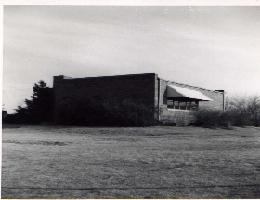 the
four grades. It was a blast. I would show up for school dressed
very casually and go through the motions of presenting little
lessons to each class in each subject.
the
four grades. It was a blast. I would show up for school dressed
very casually and go through the motions of presenting little
lessons to each class in each subject. 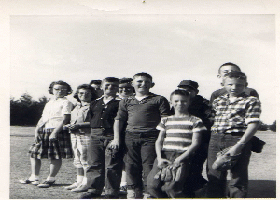 iss
those games good-bye before they even started.. The boys in their
blue denim jeans and shirts and the girls with their long denim
skirts swishing back and forth as they ran bases, or ran up and
down the basketball court. It was an amazing sight, indeed. These
kids had no TV to watch, no comic books to read, no movies to
attend, or no otherworldly pleasures to occupy their time. But
obviously there were no rules against playing ball----and play
ball they did, night and day.
iss
those games good-bye before they even started.. The boys in their
blue denim jeans and shirts and the girls with their long denim
skirts swishing back and forth as they ran bases, or ran up and
down the basketball court. It was an amazing sight, indeed. These
kids had no TV to watch, no comic books to read, no movies to
attend, or no otherworldly pleasures to occupy their time. But
obviously there were no rules against playing ball----and play
ball they did, night and day. 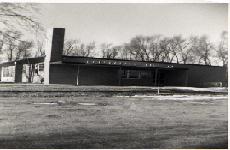 the
chance to serve in the Peace Corps and finished out the school
year at Prosperity School.
the
chance to serve in the Peace Corps and finished out the school
year at Prosperity School.
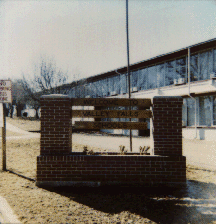 and
junior high school social studies teacher in Valley Falls. I had
never heard of Valley Falls, but a quick check of the map revealed
that it wasn't very far from Kansas City. I wrote a letter of
application and was quickly granted an interview on Saturday
morning. I found myself in the kitchen of Dr. Ted Jones, the
Superintendent of Schools, being offered a glass of water, along
with a contract to teach the following school year.
and
junior high school social studies teacher in Valley Falls. I had
never heard of Valley Falls, but a quick check of the map revealed
that it wasn't very far from Kansas City. I wrote a letter of
application and was quickly granted an interview on Saturday
morning. I found myself in the kitchen of Dr. Ted Jones, the
Superintendent of Schools, being offered a glass of water, along
with a contract to teach the following school year.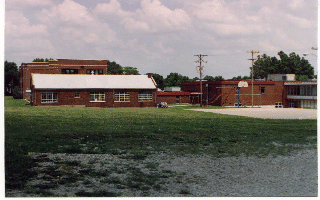 tayed
for probably twenty years or so. After some years, most people
didn't even realize---or had long forgotten---that I had even
taught anything except sixth grade. Of course, the students that I
taught didn't forget. Later on, I would teach many of their
children. In fact, I even taught children of the students that I
taught earlier in sixth grade. That's what happens when a person
stays in one place for more than thirty years.
tayed
for probably twenty years or so. After some years, most people
didn't even realize---or had long forgotten---that I had even
taught anything except sixth grade. Of course, the students that I
taught didn't forget. Later on, I would teach many of their
children. In fact, I even taught children of the students that I
taught earlier in sixth grade. That's what happens when a person
stays in one place for more than thirty years. 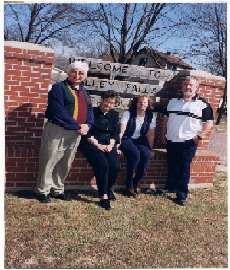 to
write a commentary on my work here in Valley Falls---even after
thirty years. But after having taught on every level now---high
school, junior high school and elementary---and having served on
every conceivable committee; and after having been counselor for
more than five years; and after having written a district
technology plan, a professional development plan, several Title 1
plans and a Local Consolidated Plan; and after having spent
countless hours filling out forms to apply for e-rate discount;
and after writing a largely bull ____ application which won our
school recognition as a Redbook School of the Year; and after
fixing more computer problems than I ever care to remember; and
after giving more state, local and national tests than can ever be
useful; and after having sat through enough council and committee
meetings to boggle most people's minds; and after having generated
a library of charts, graphs, and memos------Well, what I guess I
am trying to say is that one of these days I may feel somewhat
qualified to make some cautious comments---perhaps at the time of
my retirement.
to
write a commentary on my work here in Valley Falls---even after
thirty years. But after having taught on every level now---high
school, junior high school and elementary---and having served on
every conceivable committee; and after having been counselor for
more than five years; and after having written a district
technology plan, a professional development plan, several Title 1
plans and a Local Consolidated Plan; and after having spent
countless hours filling out forms to apply for e-rate discount;
and after writing a largely bull ____ application which won our
school recognition as a Redbook School of the Year; and after
fixing more computer problems than I ever care to remember; and
after giving more state, local and national tests than can ever be
useful; and after having sat through enough council and committee
meetings to boggle most people's minds; and after having generated
a library of charts, graphs, and memos------Well, what I guess I
am trying to say is that one of these days I may feel somewhat
qualified to make some cautious comments---perhaps at the time of
my retirement.